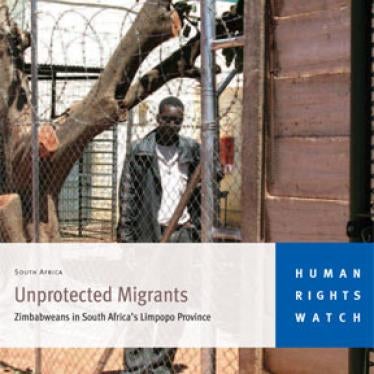(Johannesburg) - The South African government should ensure that “temporary shelter sites” for homeless and traumatized victims of recent xenophobic violence comply with international standards, Human Rights Watch said today. The UN Guiding Principles on Internal Displacement require states to provide food, water, shelter, medical care and security to displaced persons.
Following an outbreak of xenophobic violence in various parts of South Africa in mid-May, which targeted nationals of other African states, tens of thousands of foreign nationals have lost their homes and property. The internally displaced victims are being relocated from police stations and community halls to sites where aid agencies and the South African authorities are providing shelter and other assistance, but humanitarian agencies are concerned the sites fail to meet basic standards.
“Hasty government decisions to relocate these people means there hasn’t been enough time to prepare the sites for safe and dignified human habitation,” said Georgette Gagnon, Africa director at Human Rights Watch. “These people’s lives have been shattered by the recent violence and now they’re forced to live in sub-standard shelters.”
Human Rights Watch said that the government’s failure to consult the people it is relocating, its failure to give them some choice in what happens to them and the substandard living conditions in many of the sites means South Africa is breaching international standards on the rights of displaced persons.
Many humanitarian agencies have criticized the living conditions at the sites, which in some cases pose a threat to the health of the displaced. Much of South Africa is currently experiencing cold and rainy conditions, adding to the misery experienced by the displaced.
Following a comprehensive assessment carried out in many of the sites, a number of organizations, including the South African Human Rights Commission, United Nations agencies and the International Federation of the Red Cross, met on June 1, 2008, with senior government officials to voice their concerns about the speed of the relocations and the appropriateness of many of the sites.
They raised issues that included the lack of consultation and information-sharing with the displaced, separation of women from their children during relocation, hostility from local residents living near the relocation sites, the lack of security in and around sites, inadequate access to water and healthcare, the high density of tents in certain sites, and lack of sanitation facilities.
Two leading aid organizations, Médecins Sans Frontières (Doctors Without Borders) and Oxfam, also publicly expressed concern about the substandard conditions of shelter, water and sanitation, and security.
Despite the concerns raised by the humanitarian community, the South African authorities decided to move ahead with their relocation plans in Gauteng, Western Cape, and KwaZulu Natal Provinces.
During the last two weeks of May, foreign nationals – mainly from Mozambique, Somalia, and Zimbabwe – faced a wave of violence carried out by South Africans in many parts of the country. The violence killed at least 62 people, injured at least 670, and destroyed the shelters of tens of thousands who became homeless and displaced, and who took shelter mainly in or near police stations. Similar violent incidents took place throughout 2007 and early 2008.
The UN Guiding Principles on Internal Displacement set out how the authorities should provide people they plan to relocate with full information about the reasons and procedures for their relocation and should ensure that it is carried out in a way that respects their dignity and security. The principles also require governments to ensure that the displaced have, at a minimum, access to essential food and drinking water, basic shelter, and essential medical services and sanitation. Finally, the principles require that the authorities ensure the right of the displaced to “return voluntarily, in safety and with dignity, to their places of habitual residence or to resettle voluntarily in another part of the country.”
The Guiding Principles reflect human rights and other international law, and provide a consolidated set of international standards governing the treatment of people displaced inside a country.
“This is the first time that South African authorities have to deal with the challenges of setting up sites for the displaced,” said Gagnon. “The world is watching, and while aid agencies are willing to help, they’re frustrated by the government’s plan. South Africa needs to get its act together.”







